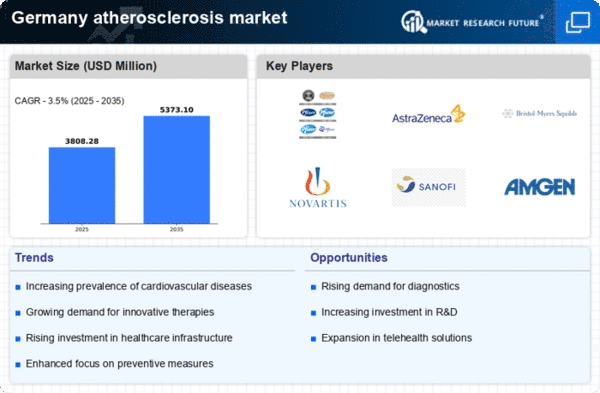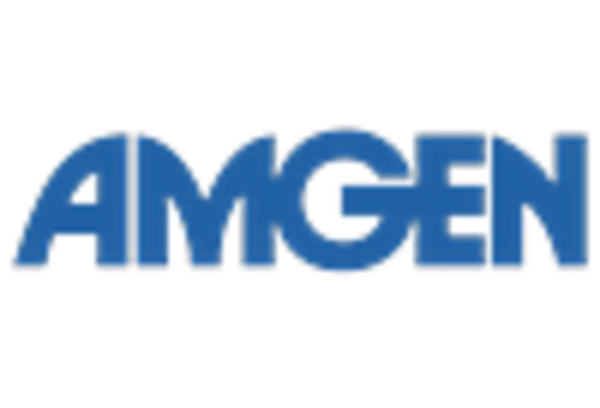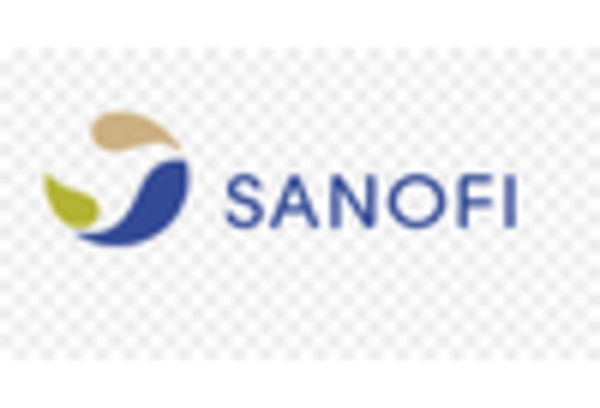Increasing Aging Population
The aging population in Germany is a critical driver for the atherosclerosis market. As individuals age, the risk of developing cardiovascular diseases, including atherosclerosis, escalates significantly. Current statistics indicate that approximately 22% of the German population is aged 65 and older, a demographic that is particularly susceptible to atherosclerosis. This demographic shift necessitates enhanced healthcare services and interventions aimed at managing cardiovascular health. Consequently, the demand for diagnostic tools, treatment options, and preventive measures in the atherosclerosis market is likely to rise. Healthcare providers are increasingly focusing on tailored therapies and lifestyle modifications to address the unique needs of older patients, thereby driving growth in the market.
Rising Healthcare Expenditure
Germany's healthcare expenditure has been on an upward trajectory, which serves as a substantial driver for the atherosclerosis market. In 2025, healthcare spending is projected to reach approximately €500 billion, reflecting a commitment to improving health outcomes. This increase in funding allows for the development and implementation of advanced diagnostic and therapeutic options for atherosclerosis. Furthermore, the German government has been investing in public health initiatives aimed at reducing the burden of cardiovascular diseases. As a result, healthcare providers are better equipped to offer innovative treatments and preventive strategies, thereby enhancing the overall management of atherosclerosis and contributing to market growth.
Government Initiatives and Policies
Government initiatives and policies aimed at combating cardiovascular diseases are crucial drivers for the atherosclerosis market in Germany. The government has implemented various programs focused on prevention, early detection, and treatment of atherosclerosis. These initiatives often include funding for research, public health campaigns, and subsidies for innovative treatments. In 2025, it is anticipated that government spending on cardiovascular health initiatives will increase by 15%, reflecting a strong commitment to reducing the prevalence of atherosclerosis. Such policies not only enhance access to care but also stimulate market growth by encouraging the development of new therapies and technologies tailored to address the needs of the population.
Technological Innovations in Treatment
Technological advancements in medical devices and treatment modalities are significantly impacting the atherosclerosis market in Germany. Innovations such as minimally invasive procedures, advanced imaging techniques, and novel drug delivery systems are enhancing the efficacy of atherosclerosis management. For instance, the introduction of drug-eluting stents has revolutionized the treatment landscape, reducing the need for repeat interventions. In 2025, the market for cardiovascular devices is expected to grow by approximately 8%, driven by these technological innovations. As healthcare providers adopt these cutting-edge solutions, patient outcomes are likely to improve, thereby increasing the overall demand for atherosclerosis-related products and services.
Growing Awareness of Cardiovascular Health
There is a notable increase in public awareness regarding cardiovascular health in Germany, which is positively influencing the atherosclerosis market. Educational campaigns and initiatives by health organizations have emphasized the importance of early detection and management of atherosclerosis. This heightened awareness has led to more individuals seeking medical advice and undergoing regular health screenings. Consequently, the demand for diagnostic tests and treatment options has surged. In 2025, it is estimated that around 30% of the population will actively engage in preventive health measures, further propelling the atherosclerosis market. This trend indicates a shift towards proactive healthcare, which is likely to foster innovation and investment in the sector.
















